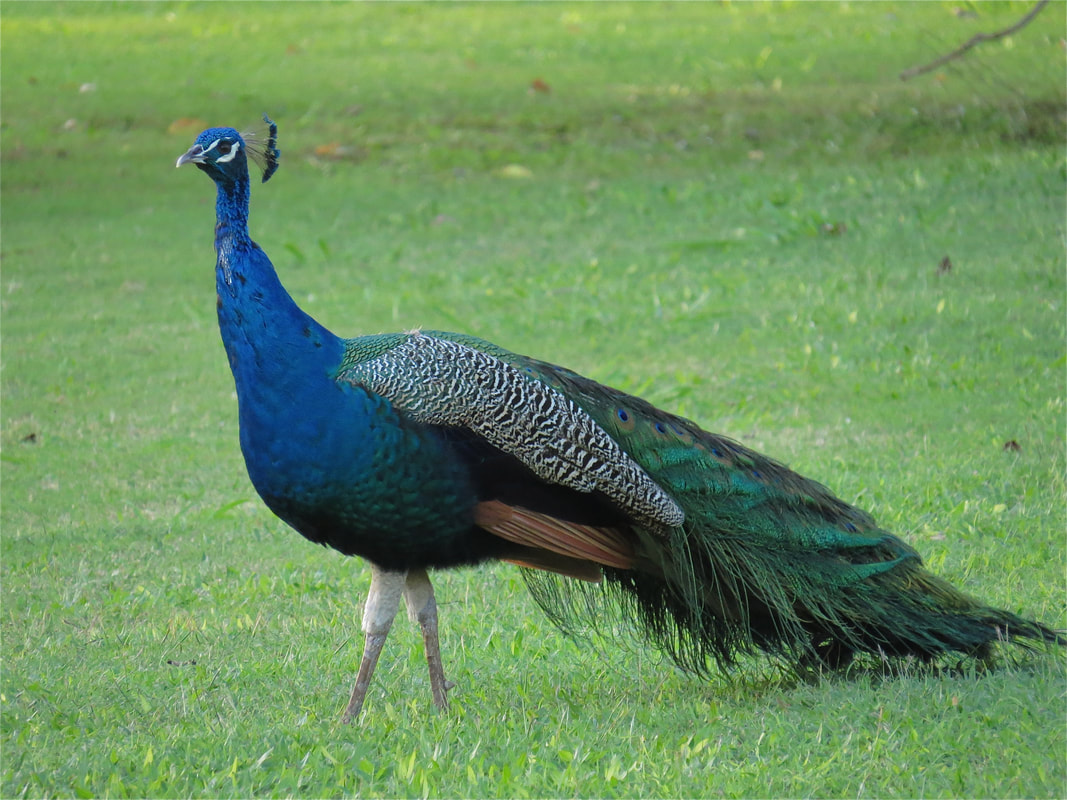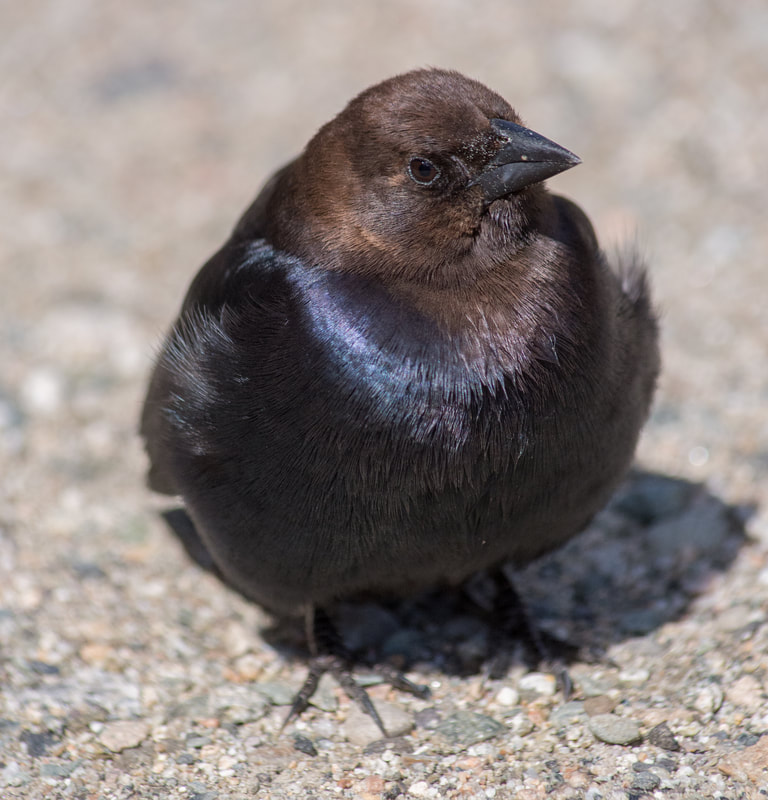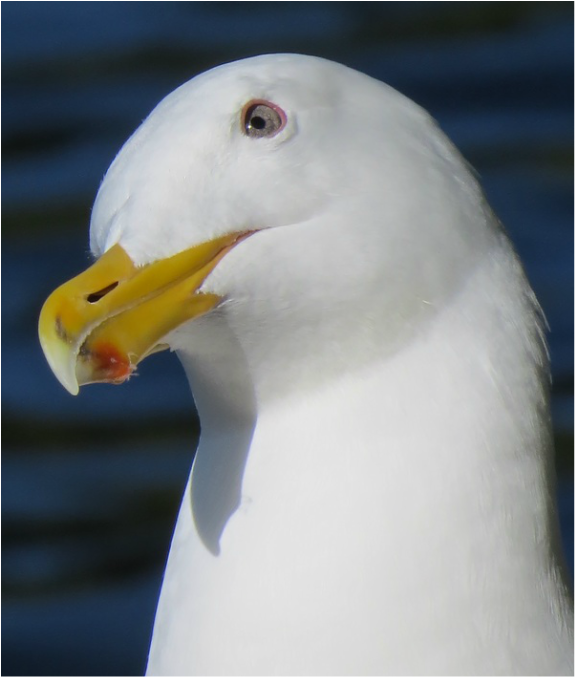The Surrey city council recently passed a motion to capture and relocate the approximately 100-150 peafowl that live in the Sullivan Heights area of Surrey, BC. These peafowl are all descendants of the few birds that were left behind by a negligent resident who moved away in 2006. Their growing presence has created deep rifts in the local community, as those who enjoy their presence clash with those who dislike the noise and mess that they create. The city's plan is to gradually capture the birds and relocate them to the Surrey Animal Resource Centre.
It's clear that the birds were creating problems in the community as the fight between pro- and anti-peafowl residents was getting more embittered. City officials clearly needed to address the issue in some way. A humane capture and relocation program seems like a good option for a non-native, introduced, exotic species.
It's clear that the birds were creating problems in the community as the fight between pro- and anti-peafowl residents was getting more embittered. City officials clearly needed to address the issue in some way. A humane capture and relocation program seems like a good option for a non-native, introduced, exotic species.
A male Indian Peafowl (Pavo cristatus) I photographed in Victoria's Beacon Hill Park. As the name suggests, they are native to the Indian subcontinent, but introduced populations are found worldwide. Due to their natural glamour and relaxed disposition (for a bird), they have made an attractive species for humans to keep in parks, on estates, or in private.
However, there are several issues that are worth noting with the whole program and the community response. First of all, 100-150 peafowl is a lot of bird to care for. I am skeptical that the Surrey Animal Resource Centre (SARC) really has the capabilities and support to tend to these birds. As far as I am aware, the centre's main function is to find homes for orphaned or abandoned pets (mostly cats and dogs). But it is illegal to keep peafowl as pets in BC (as it should be), so presumably SARC will be tasked with caring for the birds entirely on their own. Do they actually have the resources for this? I don't know the answer.
Another issue here is that the city's plan includes providing individual property owners with traps upon request. This seems like an immensely bad idea to me. The city has hired a "certified biologist" (I assume this means a certified wildlife biologist) to ensure that the captures are done ethically, but how exactly is that going to be possible when the city is also going to equip private citizens with traps? Perhaps they envision educating a private citizen on the proper and ethical way to capture a peafowl; a nice idea, but one that is going to create problems. There is already considerable animosity towards these birds by some community members. One resident has admitted that while the birds are beautiful, he hates pretty much everything else about them. It isn't hard to imagine someone like this neglecting the proper capture methods accidentally through carelessness or intentionally through malice. Why introduce this level of uncertainty into the process, especially when the potential for abuse of the peafowl is high? 150 birds will take awhile for the city to capture itself, but the length of time is hardly prohibitive.
I believe this reflects the general feeling among most policy-makers and many (most?) private citizens that consideration and treatment of wildlife are simply not in the same ethical category as pets or humans. Legally speaking, wildlife are generally viewed as a commodity or natural resource. And while I would guess that most people would balk at the idea that their pets should be viewed similarly, the courts have repeatedly taken this perspective. This is a major ethical failing of modern society in my opinion, but it's one that is likely to persist for some time.
Yet, the peafowl situation in Surrey reflects another problem with wildlife too, one whose ethical resolution is far murkier in my eyes. One pro-peafowl resident states that "You see them walking gracefully on the sidewalk, minding their own business. They give out a call; that's nature." It's a sentiment I am very sympathetic too, but in this case, we are talking about a non-native, exotic, introduced species. Dealing with such species is a notoriously tricky ethical problem.
Human behaviour has been responsible for the introduction of all kinds of new species into new environments. Sometimes, the introduction is sudden and stark, as with the case of the Surrey peafowl (not even native to the continent). Other times, the introduction is indirect, the passive result of other processes like the clearing of traditional ecological barriers. The spread of the Brown-headed Cowbird (Molothrus ater) is an excellent example in North America. Before urban developments on the continent, the species lived in the prairies. But as humans cut down forests and cultivated more farmland, the cowbird spread and is now a continental resident across the entire contiguous US, every Canadian province, and most of Mexico. As they are brood parasites, they have had substantial negative effects on many other songbird species that traditionally did not have to contend with the cowbird. There's no going back to the way things were for the cowbird given the reality of human development. Ethically speaking, while they may be driving other species to vulnerability, they should not be forcibly removed from those areas to which they have expanded.
A Brown-headed Cowbird (Molothrus ater) I photographed at Britton Creek along the Coquihalla in summer 2017.
Truly introduced species though, like the Surrey peafowl, don't fit this mould. Removal is a reasonable - perhaps necessary - course of action, in the interest of preserving the native ecosystem. Of course, it was entirely the fault of our own species that these birds were introduced to begin with; thus, our species is the one that must alone bear the labour and cost of remediation, ethically speaking. This is far easier said than done. We can ethically remove them from Sullivan Heights and even provide them with comfortable homes to live out the rest of their days (we can do this; I'm not convinced that the Surrey City Council's plan will actually accomplish this), but we will also remove the ability of these birds to reproduce. With birds, this usually means allowing them to mate and lay eggs, but then either removing these eggs before they hatch (perhaps replacing them with plastic dummy eggs), or oiling these eggs to prevent fetal development and hatching. Is this ethical? Do peafowl feel despair at an inability to produce offspring? We know that other birds can feel this kind of sadness; do peafowl? We simply don't have an answer at this point. And as a result, we don't have an answer to the ethical question either.
I remain skeptical but hopeful that the City of Surrey will do right by their resident peafowl. I think that people are slowly becoming more attuned to the ethical issues that are involved when humans intersect with wildlife, but our society (and especially our laws) still have a very long way to go.





 RSS Feed
RSS Feed
